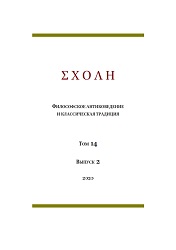Еще раз к вопросу: счастлив ли пирронический скептик? О понятиях ἀταραξία и πάθος у Секста Эмпирика
Is the Pyrrhonist happy, again? On ἀταραξία and πάθος in Sextus Empiricus
Author(s): Denis MaslovSubject(s): Ancient Philosphy, Existentialism, Philosophy of Mind, Ontology
Published by: Новосибирский государственный университет
Keywords: ataraxia; skeptical tranquility; skeptical anxiety; Ancient Pyrrhonism; Sextus Empiricus; pathos; passion; Eudaimonia; happiness; belief;
Summary/Abstract: The article tackles the question whether the Pyrrhonian skeptic can be happy having “pathe” in his life. Thus, the consistency of Pyrrhonian skepticism is discussed. In the first section, I consider the notions of ataraxia and tarache. The source of unhappiness is considered by Sextus to be beliefs about the good and the evil, which give rise to intense longing that creates anxiety. Sceptical suspension of judgement extirpates beliefs and therefore this anxiety. In the second section, the notion of pathe is analyzed in comparison with the Stoics. Pathe, such as hunger, thirst, pain, etc., are inevitably and involuntarily present in the life and they create a certain kind of distress. Because of their unreasonable and necessary nature, pathe cannot be disposed of but are nevertheless moderate and hence bearable. The question is, therefore, whether pathe can cause distress directly or through compelling people to form beliefs, which is examined in the third section. Sextus clearly distinguishes between these things as being dependent (beliefs) and independent (pathe) from us. A presupposition that beliefs are exclusively in our power was widely held at the time. On that ground, I argue that pathe do not originate anxiety for they cannot compel us to form beliefs. In addition, such conditions do not cause great agitation and therefore they cannot be a source of unhappiness. Those who hold something for good or true are burdened with a double distress – mental suffering from beliefs and from pathos. Thus, the skeptical life is better off than the dogmatic one. In the last section, I try to show on example of mental pathe, which are not bodily (the search for truth, love for people, the ethos of the community), that even they do not compel the sceptic to form beliefs.
Journal: ΣΧΟΛΗ. Философское антиковедение и классическая традиция
- Issue Year: XIV/2020
- Issue No: 2
- Page Range: 618-636
- Page Count: 19
- Language: Russian

